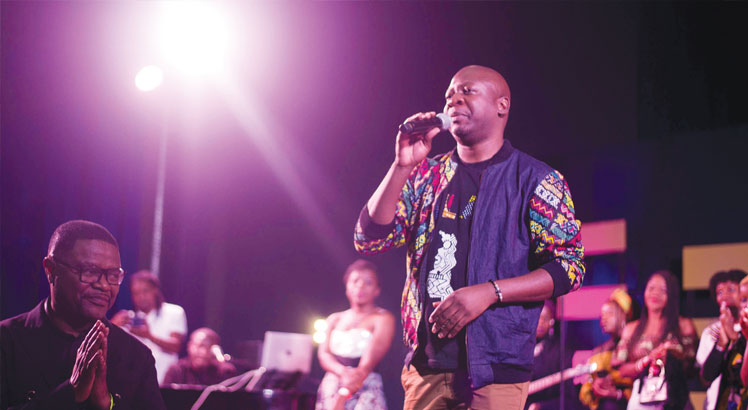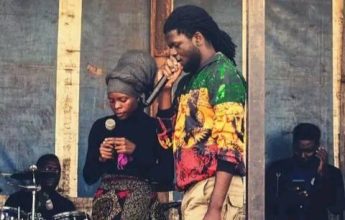Likongwe shakes the stage
 Silence is not always golden and the voice of reason in the arts has refused to die as dramatists have taken to speaking against the evils of dictatorship.
Silence is not always golden and the voice of reason in the arts has refused to die as dramatists have taken to speaking against the evils of dictatorship.
A month ago Nanzikambe Arts reminded theatre lovers, and all Malawians, of the dangers of an iron-fisted dictatorship creeping back at the helm of power in the country through their play And The Crocodiles are Hungry at Night. The play is an adaptation of poet Jack Mapanje’s memoir of the harsh life the poet went through for three years at Mikuyu Prison without trial.
As the fire was simmering, another firebrand play was premiered at the Nanzikambe Arts space in Blantyre. The President’s Prerogative is, without doubt, one of the theatrical masters to come out of Malawi in recent times. It is a hallmark of master drama guru Smith Likongwe.
The plot
The story centres around a mystical supreme ruler Apostle Joseph Njovu of Bwezani, who wants to drill oil from one of the country’s villages. The villagers, powerless as they are, resist the force, with corruption denting that battle.
From the play, one can make out several prerogatives the president makes. The first is a prerogative to issue a decree for the villagers to vacate the land of their ancestors with no compensation; another one is to reshuffle the cabinet to include the village headman of the resistant villagers to quell opposition against the decree. The other decree is to amend the constitution so the supreme ruler can have it his way. There is more.
These are not strange decrees in dictatorial African ‘democracies’.
What is more, there is evidence of political powers manipulating the airwaves to suit their tastes. In the play, this is evident when a reporter from the national broadcaster (played by Vanessa Maloya) interviews the villagers on their opinion to vacate the village to give way for the drilling of oil in the village. The villagers sternly tell the reporter they can’t allow that; they chant songs against Njovu and his leadership. But when the report is aired three weeks later, the broadcaster claims the villagers are ready to go away, praising Njovu’s ‘wise and dynamic leadership’.
Not too strange a statement it has become an apologetic cliche for dictators.
Similarities to reality
With its tight script, the play is not devoid of lines that strike heavy cords. Take for instance what Ndaziona (Maureen Mathala), a prostitute-cum-prophetess says: ‘Dictators are there because we allow them to be there’.
In a well meaning line, she preaches: “[the] true measure of government lies in how well it has served its people in all kinds of circumstances both favourable and adverse; in times of peace and stability and in times of national crisisâ€.
Several events in the play are not even far from sad home truths. Like when an executive prerogative leads to the closure of a university, forcing students like David (Yankho Seunda), a law student, to return to his home village where he joins forces with the villagers to fight the autocratic rule. The young boy has guts which he displays by showing the difference between authority and power.
He says: “Authority is when logic is carefully applied in making decisions on behalf of stakeholders…. Power is when the authorities are intoxicated with their authority to start exercising undue forceâ€.
Yet, the play is not just about hard facts, it also has witty and humorous scenes. For instance, when a village headman, Doko (Henry Ntalika), comes out of a bush where he was having some quality time with a prostitute. He is wearing his trousers inside out.
The village wizard, Nganga (Geoffrey Mbene), also sends the audience into stitches of laughter, for instance, when he suggests that he should just bewitch the absolute ruler.
Other easy moments are David’s romantic escapades with the village girl Chifundo (Catherine Phiri).
The actors, actresses
The play’s strength also lies in the mixing of theatre old guards like National Theatre Association of Malawi president Ian Chitsekula who plays Senior Chief Khalani who comes face to face with Ntalika (who was a regular feature in Wakhumbata Ensemble Theatre).
Another ace is Maloya, who has appeared for Nanzikambe in several plays, apart from her film roles in Jolly Ntaba’s The Test and Charles Simbi’s Who Cares: Wokomaatani. Thlupego Chisiza appears in the play as Khomo, the president’s special assistant.
Other upcoming but vibrant artists are Mathala, who also acted in And the Crocodiles are Hungry at Night and Thlupego’s Semo and Seunda, who featured in Dikamawoko Arts play Malawi Kwacha.
To crown it all, the choreographic works of Joshua Bhima, Robert Magasa, John Duma and Alinafe Samuel were spectacular.
“It is a powerful and creative work of art. One thing that I just noted is that some dialogues are just too long and could be trimmed. We need such works,†said Catherine Baluwa, who watched the premier.
After the premier, the play was scheduled to be taken to various venues in Lilongwe, Mzuzu and Mchinji.
In his words, Likongwe, who is a drama lecturer at the Chancellor College, said artists must never keep quiet when they see things going wrong.
Silence, the ancestors said, is golden. But Malawi drama today is proving one thing: silence is not always golden.





